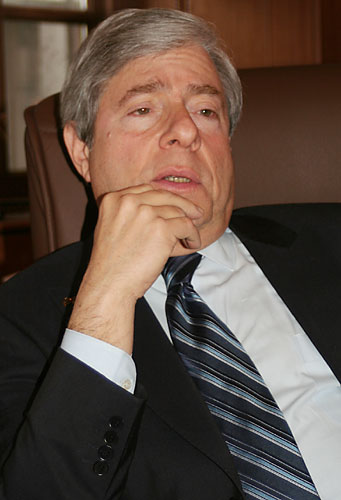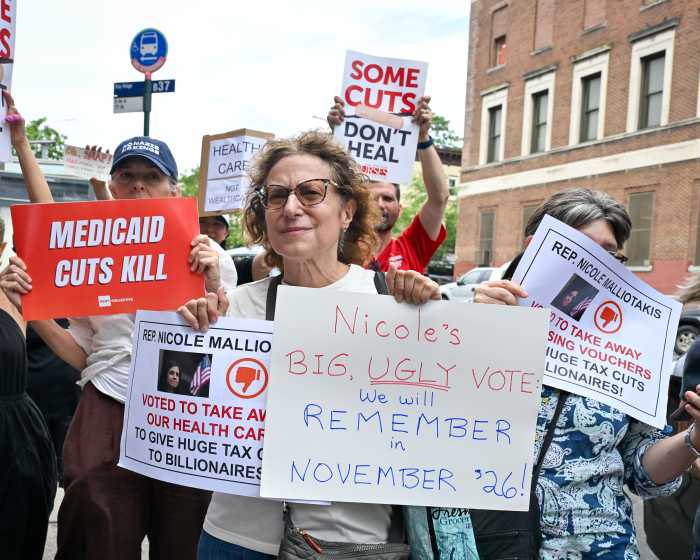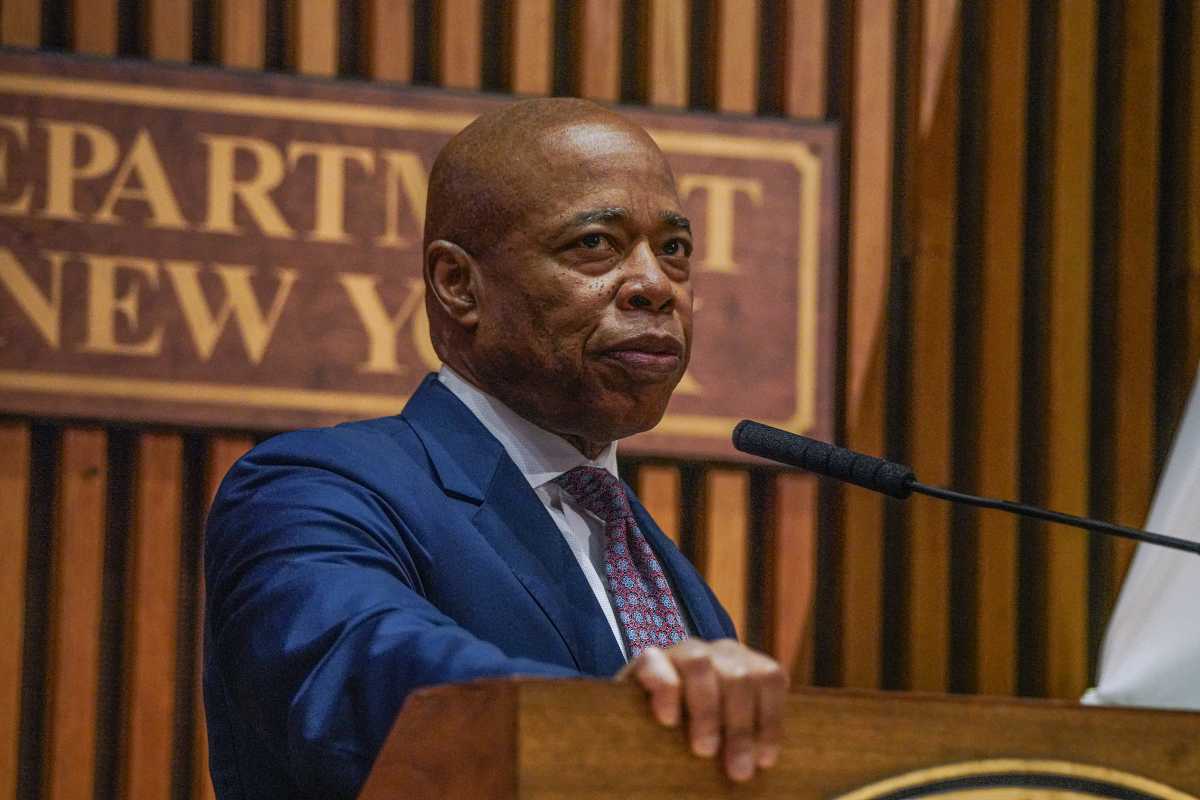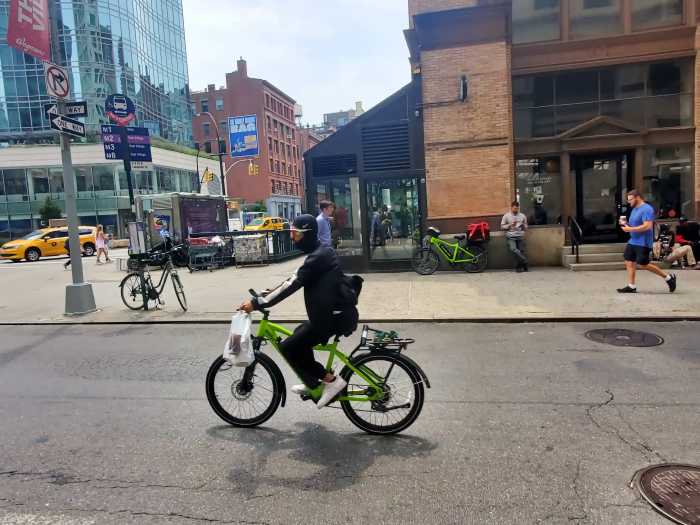He’d make a great mayor. He still loves Atlantic Yards. His city pension won’t cover his living expenses if he ever retires. And he will go to the mattresses to oppose tolls on the East River bridges.
Those are the blockbuster moments from what has become a beloved Brooklyn Paper tradition: our annual year-end interview with Borough President Markowitz.
Last week, our editor, Gersh Kuntzman, checked in with the irrepressible Beep to recap the year that was (though, alas, Markowitz kept last year’s temper in check, much to the chagrin of our headline writer!).
Below is a lightly edited transcript of the interview; or you can download the complete audio. Enjoy!
Gersh Kuntzman: As you know, it’s become a great tradition for our readers — they like a year-end synopsis from the man himself. … Let’s start with the broad vision. What were the three best things that happened to Brooklyn this year and why?Â
Marty Markowitz: One thing I can’t take credit for was the first baby walrus born [at the New York Aquarium in Coney Island].
GK: You can’t?!
MM: No. I can’t take credit for this, but it’s a great thing. … The Cyclones once again, after a number of seasons in which I had to hold my head down in shame, defeated the Staten Island Yankees. That was good for Brooklyn. And the third biggest thing, in my humble opinion, was the Floating Pool. … It certainly made a statement about the future of Brooklyn Bridge Park.
In terms of affordable housing, we’re having more affordable housing units built between 2007 and 2008 than we’ve had in a generation. … And holding onto Starrett City as an affordable housing development … bodes well. We still have far more to do, but we’re well on the road to at least ensuring … that Brooklyn remains economically and ethnically diverse. I’m happy to say that the relationship I have with the mayor and his commissioners allows me to at least be welcomed into the corridors of government. Though the powers of the borough president are modest, nonetheless I try to leverage what I’ve got so that when it comes to services, Brooklyn is not in the shadows. Whatever we get is not enough, but we are getting the respect we deserve, at least on affordable housing.
Lonely Planet naming Brooklyn as a must-see tourist spot with New Orleans and Hawaii, certainly was an exciting thing for Brooklyn. … Tourism is off the charts this year. It’s a result, very directly, of this office being involved. We go to all the tourism conventions, all year long. We’re bringing in bus operators and hotel concierges, travel writers. We very aggressively go after that market. It’s good for Brooklyn. …
The Downtown Brooklyn development is going very positively. I was at the Hotel Indigo event [on Duffield Street last week], which is an exciting concept. We all heard about Morton’s [steakhouse]. … We’re thrilled for people who enjoy that.
GK: You don’t enjoy that?!
MM: I don’t go to Morton’s and I don’t go to Peter Luger. I love Peter Luger, but I’m not a steak eater. I do eat meat, but not steak. … Peter Luger will always be the most unique steak restaurant in America. But Morton’s will be welcome and do excellent business here. …
We’re still trying to attract a Nordstrom. I have a full court press in trying to do that. …Â That whole corridor of Atlantic Yards, the Brooklyn Academy of Music area and Downtown will link Down town Manhattan and Downtown Brooklyn. [Downtown Brooklyn Partnership President] Joe Chan and his group — and me, too — are always pitching businesses to relocate here. You’ll be surprised what you’ll hear soon.
And on Court Street. It’s a big thing that Steve Green, the biggest office space manager in Manhattan, bought his first building on Court Street [16 Court St.]. That’s a good thing for the Court Street corridor, where the buildings here have not kept pace with modern business needs. …
But we’re also very supportive of downzonings [in residential neighborhoods] to preserve the contextual feeling of a community. But there are other areas, such as Atlantic Avenue, that are very appropriate for growth. …
City infrastructure has to keep pace … but Brooklyn has to grow. … Even now, even with the housing market cooling down all over the country … it’s still going gangbusters. That’s good, because it shows the economic strength of Brooklyn. But it’s bad because it makes it more difficult for people who aren’t wealthy, but want to buy something, like yours truly. That’s why I require a minimum of 20 percent affordability before I approve a project. That’s my way of making a contribution. …
I’m also proud that [we helped fund] a program at Marcus Garvey Senior Houses to be the first affordable assisted-living project, which, now that I’m 62, you begin, ever so tenderly, to think about.
GK: Affordable housing? Don’t you have a city pension?
MM: My city pension, believe me, I’ll still have to have a job [after being term-limited as borough president in 2009]. Believe me, what I’m going to earn on my city pension will not pay my rent. That’s true by the way.
GK: What are three things that happened in Brooklyn this year — not necessarily things you should be blamed for — but stuff that happened in Brooklyn that you wish had not and why?
MM: Even The Brooklyn Paper can’t accuse me of causing the tornado.
GK: We looked for an angle, but we couldn’t find it!
MM: I’ll bet you did look for an angle. But also Pfizer leaving [its longtime home in Bushwick] was not a good thing. I understand that the future of the site will be affordable housing, which is greatly needed, but the fact that Pfizer, born in Brooklyn, is leaving its home is [sad]. …
GK: A major issue for Brooklyn is the mayor’s congestion pricing plan. You oppose East River bridge tolls, but you have also said some positive things about the larger congestion-pricing plan. Can you talk about where you are?
MM: I am open to the possibility of congestion pricing because I recognize the need to cut the pollution and mitigate the traffic in the central business district of Manhattan. … But it shouldn’t be on the back of any particular area of New York City. It’s a regional issue. Every report shows that the majority of cars coming into Manhattan are from suburban areas. The plan that is being presented does not penalize those coming from the suburban areas. Any plan that puts the burden more on [city] residents …Â has to be adjusted.
Number two, if the issue is to curb pollution and congestion in Midtown, then it’s baloney to toll our bridges. That would mean that the geniuses who put this together believe that everyone going over those bridges is going to the central business district, but that’s bunk. … It’s a penalty on Brooklyn motorists. And I feel the same way about Queens. … Imposing tolls on the bridges says to me that the plan will not be balanced on the whole city. If you’re in Manhattan, you’re not touched one bit by this proposal. … The people who are living in the suburban areas and the Bronx would not be touched at all. It’s not a balanced plan.
GK: But it could be tolls on the East River and Harlem River bridges [to the Bronx].
MM: I still wouldn’t be in favor of it, unless you ensure that the suburbanites pay even more. … But who are they going to get the money from? They’ll get it from Brooklynites. And there is no assurance that that money will come back to Brooklyn … where there are areas without public transportation. And there are large areas of Queens without public transportation.
[Markowitz brought up Coney Island.]
MM: I want to make sure that the amusement area grows and is preserved — you can’t mix that with residential. That’s what makes Coney Island unique and urban; it’s the only family amusement area. The [Six] Flags, the Dorney Parks, even Disney — it all began at Coney Island. …
But just like Atlantic Yards, there is contention. … Thank God, we have a society where they can have their voice heard.
GK: Indeed, in this case, there will be a ULURP [a thorough public review, unlike at Atlantic Yards].
MM: That’s because [Coney Island] is city property. The Atlantic Yards …Â of course the statement by Dan Doctoroff [a reference to the deputy mayor’s comment that Atlantic Yards should have gone through the ULURP process]. All I can say is the state decided that this was their project. Dan Doctoroff went along with that. The mayor endorsed it wholeheartedly. [Doctoroff] has the right to reflect, of course. Here it is at the end of 2007, and there are no shovels in the ground yet. It’s very frustrating. Those who oppose it are delighted, but for those who think it’ll be good for New York City, it’s frustrating, but it has to go through the process.
GK: What’s the status of your run for higher office? You’ve been coy. Are you going to run?
MM: I wouldn’t say “coy.”
GK: I didn’t mean “coy” as a negative thing.
MM: I’ve never been indecisive about anything, pretty much, except whether I should eat that second bagel. … But this is one that I think about every day. … I have to make a decision on whether what I’ve done here in Brooklyn is something I could duplicate citywide. But I know one thing, Brooklyn has a story to tell. We can prove to the world that people of various ethnic and religious groups can live together in a community with mutual respect. That’s our story.
I have a hunch that I know that it takes to run a mayoral campaign. … I know the wear and tear. I know the agita and I know the excitement. … I’ve only had a little experience as borough president, so it’s five times more, plus all the additional attention and scrutiny and [having] The Brooklyn Paper bashing you in almost every issue — and other publications, too, that would be happy to get on the bandwagon because that’s the way with journalism. They try to pick you up and knock you down and pick you up and knock you down. Some of it you bring on yourself and some of it you didn’t do at all — at all! But you’re open to any and all potshots when you’re an elected official, real or make believe. And when you run for mayor, it gets worse, not better.
But I know that I have the intellect to be a great mayor … and hopefully one of the best the city’s ever had. … I think there’s a lot I would offer New York. I do. … I recognize that the train has moved from a stationary position and it is moving away from the station. I recognize that. But it will be done on my timetable. So stay tuned.
GK: You know, it’s dangerous to jump on a moving train. The MTA tells us that.
MM: That’s true. … But I think we have a lot to share with New York City what we’re doing here in Brooklyn. …Â If I’ve accomplished making your life better, making you prouder that you live here in Brooklyn and putting a smile on your face, than I’ve accomplished what I set out to do. …Â and I think I could translate that to New York City. …
If I run for mayor and am chosen to be mayor, I will be a mix of a number of people who have been mayor of New York City.
GK: Who?
MM: I love LaGuardia, of course, and Ed Koch, of course. And I liked Dinkins very very much. And I absolutely adore Mike Bloomberg. If I could be a mix of those four —Â and at the same time add in my stuff, maybe it’ll be what New York City wants. … But I wish there were no term limits. …
I hope I’ve made life better in Brooklyn. … But as mayor, I know that New York City would move ahead. My objective as mayor would be to keep it safe, keep it clean and keep it working.
GK: It’s a good slogan: Safe, clean and working.
MM: So we’ll see.
























